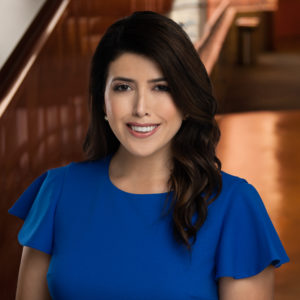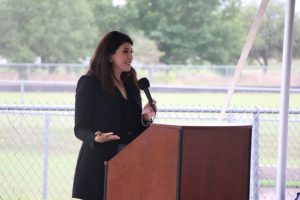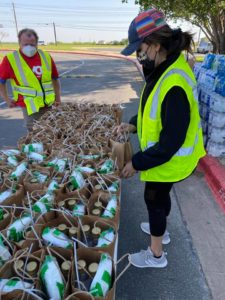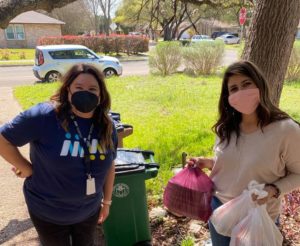 In order to raise awareness of civics and government in Travis County, Austin Tech Alliance conducts periodic interviews with our elected officials. ATA had a Q&A with City of Austin Councilwoman Vanessa Fuentes, District 2. We talked about running for office, tech, the pandemic and how to get involved.
In order to raise awareness of civics and government in Travis County, Austin Tech Alliance conducts periodic interviews with our elected officials. ATA had a Q&A with City of Austin Councilwoman Vanessa Fuentes, District 2. We talked about running for office, tech, the pandemic and how to get involved.
What inspired your run for City Council and your desire to be involved in local politics?
In Austin, we have a significant health divide. Folks who reside west of I-35 live on average 10 years more than Austinites who live east. I firmly believe that your zip code shouldn’t determine your life outcome. As someone who will be raising a family in Southeast Austin, I decided to run for Council to change this.
Prior to City Council, I did advocacy work for the American Heart Association. This included successfully raising the tobacco sales age to 21 and requiring congenital heart screenings for newborns. I am a community advocate first, which allows me to lead with everyday Austinites in mind.
I also worked on criminal justice reform and constituent relations at the state level. I saw women policymakers rally for various causes during my time there. It showed me how much representation matters. We need more women and Latinas in all levels of government. I am committed to holding the door open for the next generation.

What are your general priorities for this term as a council member?
We are still in a pandemic and that continues to be my top priority. We need to get more people vaccinated, especially our communities of color. As of July 18, only 39% of Hispanic/Latinos and 28% of Blacks/African Americans are fully vaccinated in Travis County. Considering nearly half of all deaths here have been Latinos yet not even 50% are vaccinated, it is a problem.
At the start of the vaccine rollout, we missed valuable time to reach these groups in an equitable way. Now we are battling vaccine hesitancy. We must continue the work to meet people where they are and get them the facts from trusted community leaders. As the Delta variant spreads at a rapid rate, it’s more important than ever to act fast.
We need better access to health care in District 2. Pockets of the area are classified as food deserts, making it challenging for folks to access healthy options. And Winter Storm Uri magnified the gaps in our disaster emergency response putting vulnerable people at higher risk than necessary.
The freeze was a stark reminder of the climate crisis we’re in, but my constituents know it all too well because of the history of flooding in our neighborhoods. In fact, the first piece of policy I brought forth was to address our flood response.
With the American Rescue Plan dollars, we were able to allocate money to meet this moment. I’m proud of the efforts of my office to get money earmarked for many of these priorities. But the work is not done. I’m focused on early childhood education, workforce development and anti-displacement efforts. I’m fighting to secure funding from the upcoming budget to make sure the Austinites of today have a place in the Austin of tomorrow.
 What do you believe are the biggest issues the people of Austin are facing right now, especially relating to the pandemic?
What do you believe are the biggest issues the people of Austin are facing right now, especially relating to the pandemic?
Many of the issues we are seeing right now in Austin are not new. Lack of health care, food access, emergency response planning—the pandemic has only highlighted these matters that minorities have historically experienced. This is especially true for those in southeast Austin.
More specifically to COVID, people who choose not to get vaccinated or follow mask and social distancing guidelines are slowing down our efforts to leave this pandemic behind us. It’s critical we reach the vaccine hesitancy population and get them to better understand the importance of this lifesaving shot. Hospitalizations for younger people are on the rise. We must protect children under 12 who can’t get vaccinated yet and the immunocompromised.
This is why I have been advocating for community health workers. These trusted frontline workers are the lifeline between marginalized folks and providers. In the case of the pandemic and vaccines, they could make the difference between life and death for some. We also continue to see a huge digital divide. The Internet has become a necessity, and to be an equitable society we need broadband infrastructure that works for all.
We are making progress, though. I am proud of the policy we have pushed for our pandemic response, especially rent relief and grants for the creative arts community. District 2 is more than 45% renters and, of course, our musicians and artists are the heartbeat of the city.
We do have additional pressing issues. Housing, homelessness and public safety consume the narrative and rightly so. We have an affordability crisis that’s leading to displacement. Though we’ve made huge strides to meet the needs of our unhoused neighbors, the actions that led us here have fed into the polarizing opinions around our response efforts. And we have a staffing shortage in our police department that’s been unfairly pinned on reimagining public safety. I support adding cadets to the workforce, especially at a time when we are seeing some increase in crime across the nation following a longer-term downward trend from the last two decades. While boots on the ground are needed, we must also look at the variation in people who boot up. We know resources such as community health workers are just as vital to our approach of public safety.

What do you think is the best way for Austinites to get involved in local politics?
It’s important we as policymakers create multiple points of entry for anyone and everyone to get involved in local politics. I am active on social media and in outreach efforts such as town halls and attending community events. I tirelessly remind my constituents to reach out and engage. And I reciprocate the communication. We can’t let our society become apathetic to government, otherwise the law of the land no longer reflects the people of the place.
I encourage Austinites to connect with their Council Members and other representatives. The City makes many efforts to let citizens offer feedback too. From surveys and open houses to public comment at meetings and the SpeakUp, Austin! website, there’s no shortage of ways to have your voice heard. If you’re really motivated about getting involved, ask your Council Member about serving on a board or commissions. We have more than 40 appointments that are liaisons between us and the locals in specific topics from veterans’ affairs to the environment.
Community organizations are another great way to get involved. To name a couple, I have been a member of Del Valle Community Coalition and Young Women’s Alliance, both of which have strengthened my commitment to service and grassroots efforts to improve our city. Find a group that aligns with your values.
I also think it’s important to support our local journalists. Not only do they keep us informed but their work helps hold government accountable.
How does or might the city partner with local businesses or tech companies to make the city function optimally? How can technology help Austin return to more normalcy?
The more we partner with local businesses and tech companies the better off Austin will be. We saw this with the many local businesses who stepped up during the winter storm, whether it be to offer donations or services. These relationships should be ongoing, including open lines of communication of how we can work together in times of crisis and beyond.
The freeze also showed us how vulnerable our infrastructure is. We have some of the most innovative tech companies in the world here. I want to see us partner to find solutions for our more pressing problems. At the bare minimum, how can we make sure that the basic services we provide as a city are top notch. The online challenges experienced during the period we were scheduling vaccine appointments were unnecessary. I can’t help but think with some assistance from our tech community it could have been a different story.
This doesn’t even factor in the people who couldn’t access the internet to begin with. Being the tech city that we are, it’s reason enough to expand broadband and make it free. The City can be an innovator on this front right along with the tech companies.
To contact City of Austin Councilwoman Vanessa Fuentes, visit her website.
